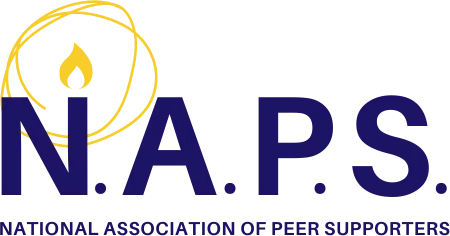Our Mission, Vision, and History
Our mission is to support a national, community-oriented movement of people with lived and living experience in returning to our historical roots as we reimagine the future of peer support.

What N.A.P.S. is all about.
On this page, you’ll find more information about the mission and vision that guides the work of N.A.P.S.
Our Mission
The mission of N.A.P.S. is to support a national, community-oriented movement of people with lived and living experience in returning to our historical roots as we reimagine the future of peer support.
Our Vision
We envision a world where peer support transcends institutions and systems, thrives in everyday conversations, and embodies mutual aid and grassroots community networks as the foundation of collective healing and movement.
The History of N.A.P.S.
N.A.P.S (National Association of Peer Specialists) was started in 2004 by a dedicated group of peer specialists in Michigan. We later became the International Association of Peer Supporters, Inc to reflect an increase in international members and a desire to include all peer supporters, not just those with the title “peer specialist”, and registered as a 501c3. Steve Harrington was instrumental in getting and keeping the group going, including through establishing N.A.P.S’ annual National Conferences around the US, with its first in 2006. Over the years, N.A.P.S has presented 41 webinars – 29 are recorded and still available for anyone to watch and members may take a quiz and receive a certificate of contact hours of ongoing education.
Practice Standards
In 2012, N.A.P.S embarked upon an inclusive process, with assistance from a panel convened by SAMHSA, to establish Practice Standards for the emerging profession of Peer Support, as a first step in a possible national credential. Following a series of national focus groups and surveys, in which over 1000 peer support providers participated, 98% agreed with the core values and practice guidelines, which were published in the summer of 2013 as the National Practice Guidelines for Peer Supporters. Over the course of 18 months from March 2018 to September 2019, a workgroup conducted multiple discussions, surveys and focus group sessions to develop the National Practice Guidelines for Peer Specialists and Supervisors to complement the 2013 Guidelines for Peer Supporters. These guidelines were presented at the 2019 conference in San Diego.
Advanced Education
Also during this time, N.A.P.S in partnership with DBSA, participated in the SAMHSA Recovery to Practice initiative and developed Next Steps, an advanced education curriculum for peer support providers. A curriculum book was available as an open source document along with several videos, and a 4-day training with an optional 5-day, to become a Next Steps facilitator. The program was presented several times in Atlanta, Ohio, New York, Chicago, and Texas and many facilitators continue to share this training.
Global Peer Support Celebration Day
The idea of a ‘national day’ for peer supporters began to take shape at the 2014 Annual International Association of Peer Supporters (iNAPS) conference in Atlanta, Georgia. This day of celebration, recognition and reflection began when former National Director of Peer Support Services with the Veteran’s Administration, Dan O’Brien-Mazza, discussed his idea at a membership meeting. His idea sparked much enthusiasm from other N.A.P.S members. We now have Global Peer Support Celebration Day (GPSCD), an annual celebration of peer supporters and peer support to recognise their work in helping their peers with mental health, addictions, and / or trauma-related challenges move along the continuum of recovery and inclusion into their communities of choice. This annual, worldwide event takes place annually on the third Thursday in October. With the COVID-19 pandemic, N.A.P.S held GPSCD 2020 virtually, with the aim of uniting the global peer support workforce amidst changing circumstances and challenges.
N.A.P.S also participated in a study by the U.S. Government Accounting Office (GAO), which gave a report to Congress on Leading Practices for State Programs to Certify Peer Specialists, published in November 2018. In 2019, NAPS co-sponsored the International Initiative for Mental Health Leadership (IIMHL ) Exchange and Peer Leadership Match, which took place in September in New Haven, CT and Washington DC. Further in October 2019, N.A.P.S played a key role in the Mental Health and Substance
The Future of Peer Support Work
In October, 2019, N.A.P.S held its first in-person organizational strategic planning session in San Diego, CA. This planning time allowed us to individually and collectively reflect on N.A.P.S’ history and contemplate the organization’s future. Following conversations regarding financial stability and organizational capacity, we humbly came to the tough decision that N.A.P.S currently lacks the capacity to be an international professional association. To align more closely with the mission of N.A.P.S, we prioritized the development of a professional association of peer support specialists by recruiting and uniting peer support workers as members of the professional association. N.A.P.S’ focus is to provide services to their members and promote the interests of peer support specialists.
As we look to the future, we continue conversations with peer support workers in other countries to explore the establishment of an international coalition and continue to welcome individuals from across the world as both members and volunteers. N.A.P.S also plans to build strong partnerships with international organizations, participate in global gatherings and coalitions, and work to advance collaborative, peer support initiatives worldwide.
In 2020, we introduced a new logo and officially rebranded as the International Association of Peer Supporters doing business as the National Association of Peer Supporters. N.A.P.S continues to evolve as the newly installed board develops their strategic plan and vision for 2021 and beyond.
